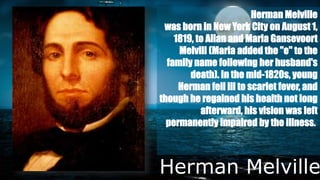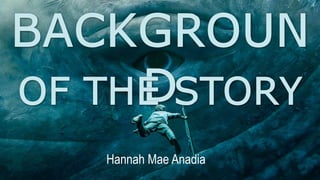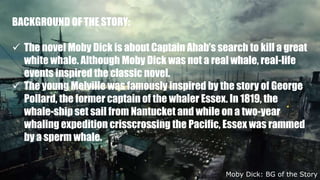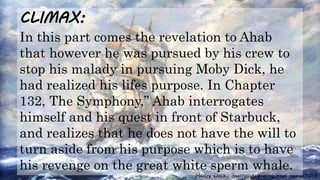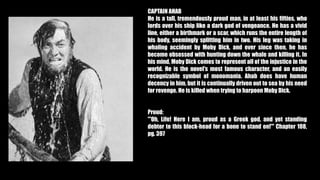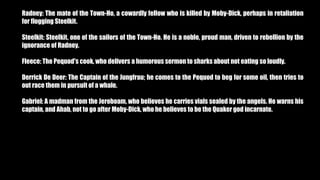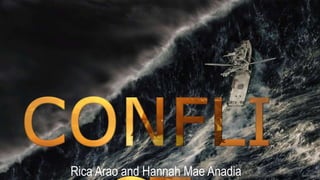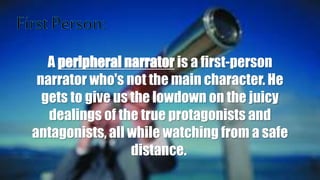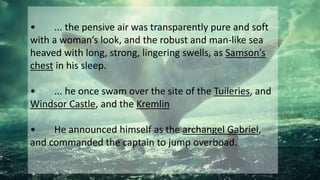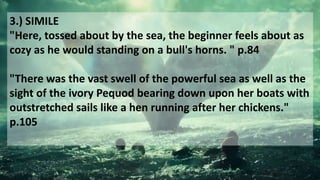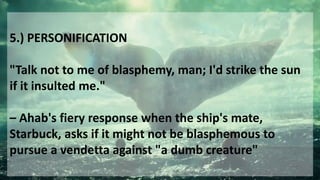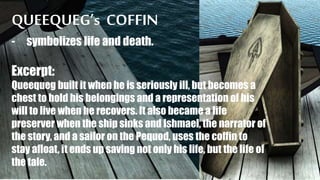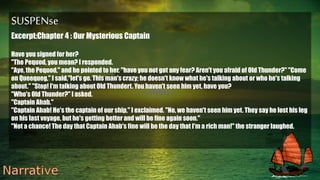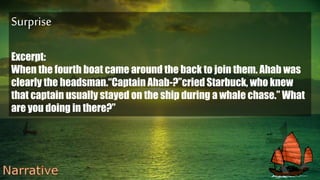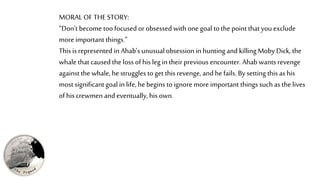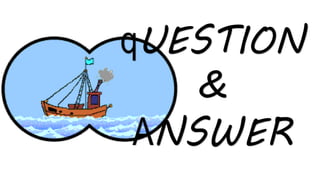Moby dick
- 4. Moby Dick: Biography of the author
- 5. Moby Dick: Biography of the author
- 6. Moby Dick: Biography of the author
- 8. BACKGROUND OF THE STORY: The novel Moby Dick is about Captain Ahab’s search to kill a great white whale. Although Moby Dick was not a real whale, real-life events inspired the classic novel. The young Melville was famously inspired by the story of George Pollard, the former captain of the whaler Essex. In 1819, the whale-ship set sail from Nantucket and while on a two-year whaling expedition crisscrossing the Pacific, Essex was rammed by a sperm whale. Moby Dick: BG of the Story
- 9. BACKGROUND OF THE STORY: Quickly abandoning the ship and thousands of miles away from land, Pollard and his crew escaped in leaky lifeboats to begin a terrible suffering that resulted sickness, starvation, and cannibalism. Moby Dick: BG of the Story
- 10. BACKGROUND OF THE STORY: The name of the whale was also inspired by real-life events. In 1839, Melville read a story in a magazine about an albino sperm whale known for its deadly attacks on whaling ships trying to hunt it down. This whale, killed off the coast of Chile near Mocha Island, was called Mocha Dick. The transformation of “Mocha” to “Moby” however, presents a greater mystery. Melville himself never explained the origin of the word. Moby Dick: BG of the Story
- 11. Anthon Añoz
- 12. Moby Dick: Intro of Characters
- 13. Moby Dick: Intro of Characters
- 14. Moby Dick: Intro of Characters
- 15. Moby Dick: Intro of Characters
- 16. Anthon Añoz
- 17. Moby Dick: Summary and Plot Structure EXPOSITION: Ishmael, the narrator, announces his intent to ship abroad a whaling vessel. From here the primary characters are introduced in his own point of view. He and Queequeg were able to secure berth on the Pequod.
- 18. Moby Dick: Summary and Plot Structure RISING ACTION: Ahab announces his quest to the other sailors and nails the doubloon to the mast as the Pequod encounters various ships with news and stories about Moby Dick.
- 19. Moby Dick: Summary and Plot Structure CLIMAX: In this part comes the revelation to Ahab that however he was pursued by his crew to stop his malady in pursuing Moby Dick, he had realized his lifes purpose. In Chapter 132, The Symphony,” Ahab interrogates himself and his quest in front of Starbuck, and realizes that he does not have the will to turn aside from his purpose which is to have his revenge on the great white sperm whale.
- 20. Moby Dick: Summary and Plot Structure FALLING ACTION: The death of Ahab and the destruction of the Pequod by Moby Dick.
- 21. Moby Dick: Summary and Plot Structure RESOLUTION: Ishmael was left as the only survivor of the Pequod’s sinking, floats on a coffin and is rescued by another whaling ship, the Rachel.
- 22. Shanin Bagatao
- 23. TIME: 1800's Excerpt: It was many year ago, some time in the early 1800's, when I found myself rather bored with the things being offered to me on land.
- 24. PLACE: #1 NEW BEDFORD Excerpt: It was a Saturday night in December when I arrived at place called New Bedford and was disappointed to learn... PLACE: Nantucket and the new england coast; the open sea and the pequod PLACE #1: NANTUCKET Excerpt: “The next day was Monday and our day of departure
- 25. PLACE:#2 PEQUOD Excerpt: “We walked down to the Pequod”
- 26. PLACE: abroad the whaling ship the Pequod in the Pacific, atlantic and indian ocean Excerpts “it takes place in a whaling ship called Pequod. while in this ship the characters travel through the Pacific, Atlantic.”
- 27. SOCIAL CONDITION: During this time whaling business was popular. Excerpt: “Even though New Bedford’s whaling business had grown larger than Nantucket’s. I had made up my mind to depart on my whaling voyage from Nantucket.”
- 28. Weather Condition: Thunder and lightning.(Stormy) . Excerpt: “The strong breeze so,that the sky and air seemed vast out bellying sails,the whole world boomed before the wind.(Herman Melvilee in Moby Dick 1851)
- 29. MOOD:obsessive and Captain Ahab ignores his imminent doom and continues to search for THE WHALE. Excerpt: “Captain ahab believes that a Moby Dick is a bad embodiment and an evil that must not exist in the world.”
- 30. Anthon Añoz
- 31. Ishmael: The narrator of the story, Ishmael disappears into his own tale after the first ten or so chapters, popping up periodically to give comments on the text. He is an every man; as such, it is difficult to describe specific things about him. He is a schoolteacher on the land, and has an open mind when it comes to the world around him. Also, he has prodigious knowledge of whaling, which he shares between chapters of plot in the narrative. Ishmael is the only man aboard the Pequod to survive the novel. - round character. He was able to get away of his boring life and bacame a ship's crew and eventually was hired as a ship crew to Pequod. He was also able to have a change in belief as he encounters different manifestations of religion.
- 32. Starbuck: The Chief Mate of the Pequod. Starbuck is a decent, honorable man. Unlike the rest of the crew, he is not taken in with Ahab's quest, and is continually trying to get the old man to turn home. Starbuck has a wife and son who he misses very much, and fears he will never see again. He is the only man willing to stand up to Ahab, and tell him his true thoughts about Ahab's obsession. Ahab has him stay aboard the Pequod during the hunt for Moby Dick, in an effort to spare him his life, which, of course, fails. - a foil to Ahab though his ideals where somehow contradictory to Ahabs but this brings fervor and motivation to Ahab to really pursue Moby Dick to have his vengeance
- 33. CAPTAIN AHAB He is a tall, tremendously proud man, in at least his fifties, who lords over his ship like a dark god of vengeance. He has a vivid line, either a birthmark or a scar, which runs the entire length of his body, seemingly splitting him in two. His leg was taking in whaling accident by Moby Dick, and ever since then, he has become obsessed with hunting down the whale and killing it. In his mind, Moby Dick comes to represent all of the injustice in the world. He is the novel's most famous character, and an easily recognizable symbol of monomania. Ahab does have human decency in him, but it is continually driven out to sea by his need for revenge. He is killed when trying to harpoon Moby Dick. Proud: "'Oh, Life! Here I am, proud as a Greek god, and yet standing debtor to this block-head for a bone to stand on!'" Chapter 108, pg. 397
- 34. Determined: "Aye, aye! and I’ll chase him round Good Hope, and round the Horn, and round the Norway Maelstrom, and round perdition’s flames before I give him up. And this is what ye have shipped for, men! to chase that white whale on both sides of land, and over all sides of earth, till he spouts black blood and rolls fin out. What say ye, men, will ye splice hands on it, now? I think ye do look brave." (36.32)
- 35. Stubb: Stubb is the second mate. He is most easily characterized by a free sense of humor; Stubb is able to laugh at everything, up to and including death itself. Unlike Starbuck, he has no fear of mortal danger, and nothing seems to bother him very much. While mending a harness or chasing a whale, his jokes remain constant. - "For, when Stubb dressed, instead of first putting his legs into his trowsers, he put his pipe into his mouth." Chapter 27, pg. 97 - a flat type of a character for all throughout the novel he didnt change his mind about the lunacy of his captain about chasing the great white whale.
- 36. Queequeg: The friendly cannibal Ishmael first meets in the city of New Bedford; they become fast and good friends, despite Queequeg's less than Christian background. Queequeg is an extremely noble, decent man, with an almost child-like wonder at the world; he is willing to put his life in jeopardy to save anyone. He becomes one of the three harpooneers of the Pequod. - "Queequeg was a native of Kovoko, an island far away to the West and South. It is not down in any map; true places never are." Chapter 12, pg. 46 - a flat character. His character didnt change througout the course of the novel. He started as a well mannered harpooner and he died as he is.
- 37. Moby Dick: The whale that gives its name to the title of the book, Moby Dick hovers outside the entire narrative, occasionally poking his head out in the stories of ships that the Pequod encounters on her voyage. He is an avenging presence, unable to be killed by human hands, and very likely immortal. He is symbolized as a vengeful God incarnate, only killing when he himself is pursued. There are reports of him taking out entire whaling vessels. He is also called the White Whale. Describing his tantamount size - "'There she blows!- there she blows! A hump like a snow- hill! It is Moby-Dick!'" Chapter 133, pg. 454
- 38. Minor Characters Fedallah: The ancient Asian who is Ahab's harpooner and spiritual guide. His prophecy regarding Ahab's death ominously foreshadows the end of the novel. Peter Coffin: The landlord of the Spouter-Inn. Bulkington: A sailor that Ishmael first meets in the Spouting-Inn, and later sees on the deck of the Pequod. His character is unknown, but he holds himself apart from the other men when Ishmael first sees him. Father Mapple: The head of the Whaleman's Chapel in Nantucket. He delivers a sermon on Jonah, and speaks of the dangers of sin. Captain Peleg: A stiffly religious man, a Quaker. The other owner of the Pequod. Captain Bildad: A boisterous, swearing man, one of the two owners of the Pequod. He helps guide the ship out of port, and plays 'good cop' to his partner, Captain Peleg.
- 39. Elijah: A sort of bum prophet that Ishmael and Queequeg meet before getting aboard the Pequod. He has dire warnings about the future of the voyage, all of which come true. Aunt Charity: Bildad's sister, who helps get the ship ready to sail. She also tries to prohibit the men from drinking on the ship, which is quickly thrown over. One of the only two women in the novel. Tashtego: A proud Indian from an island off Nantucket. One of the three harpooneers of the Pequod. Daggoo: A coal black negro-savage. One of the three harpooneers of the Pequod. Dough-boy: The ship's black steward. Pip: A fun-loving, intelligent young black boy who falls over the side during a whale hunt, and goes insane before he can be picked up again. Like Lear's Fool, he provides a counterpoint to Ahab's driven madness; Ahab takes pity on him after he goes mad, and has Pip stay below in Ahab's cabin.
- 40. Radney: The mate of the Town-Ho, a cowardly fellow who is killed by Moby-Dick, perhaps in retaliation for flogging Steelkit. Steelkit: Steelkit, one of the sailors of the Town-Ho. He is a noble, proud man, driven to rebellion by the ignorance of Radney. Fleece: The Pequod's cook, who delivers a humorous sermon to sharks about not eating so loudly. Derrick De Deer: The Captain of the Jungfrau; he comes to the Pequod to beg for some oil, then tries to out race them in pursuit of a whale. Gabriel: A madman from the Jeroboam, who believes he carries vials sealed by the angels. He warns his captain, and Ahab, not to go after Moby-Dick, who he believes to be the Quaker god incarnate.
- 41. Captain Boomer: The Captain of the Samuel Enderby, who lost an arm to Moby Dick. The Carpenter: The carpenter of the Pequod, who isn't extremely intelligent. He serves as an amusing foil for some of Ahab's rants. He is also an extremely hard worker. Perth: The blacksmith of the Pequod, who lost his family after a robbery; he helps Ahab make his harpoon. Manxman: The oldest sailor aboard the Pequod, who passes occasional words of wisdom. Mrs. Hussey: The wife of the landlord of the inn Ishmael and Queequeg stay in Nantucket; she runs the place while her husband is away. She is one of two women in the novel.
- 42. Radney: The mate of the Town-Ho, a cowardly fellow who is killed by Moby- Dick, perhaps in retaliation for flogging Steelkit. Steelkit: Steelkit, one of the sailors of the Town-Ho. He is a noble, proud man, driven to rebellion by the ignorance of Radney. Fleece: The Pequod's cook, who delivers a humorous sermon to sharks about not eating so loudly. Derrick De Deer: The Captain of the Jungfrau; he comes to the Pequod to beg for some oil, then tries to out race them in pursuit of a whale.
- 43. Gabriel: A madman from the Jeroboam, who believes he carries vials sealed by the angels. He warns his captain, and Ahab, not to go after Moby-Dick, who he believes to be the Quaker god incarnate. Captain Boomer: The Captain of the Samuel Enderby, who lost an arm to Moby Dick. The Carpenter: The carpenter of the Pequod, who isn't extremely intelligent. He serves as an amusing foil for some of Ahab's rants. He is also an extremely hard worker.
- 44. Perth: The blacksmith of the Pequod, who lost his family after a robbery; he helps Ahab make his harpoon. Manxman: The oldest sailor aboard the Pequod, who passes occasional words of wisdom. Mrs. Hussey: The wife of the landlord of the inn Ishmael and Queequeg stay in Nantucket; she runs the place while her husband is away. She is one of two women in the novel.
- 45. Rica Arao and Hannah Mae Anadia
- 46. Man Vs. Nature As Ahab’s boat rowed to the rescue, Moby Dick came up from below and slammed his forehead into Ahab’s boat sending it flying through the air. Rolling over and over, the boat landed face down in the water and the men paddled frantically out from under it. The whale obviously decided that his job was done for the day and swam off at a steady pace wiith the line dragging from his back
- 47. During a violent storm when a ship is bounced around like a toy in a bathtub, it is common for the ship’s compass needle to spin uncontrollably. This was the case on the Pequod and we had no idea which direction we were going.
- 48. “Oh, Starbuck! It is a beautiful day, the same kind of day it was when I harpooned my first whale. Forty years killing whales! Forty years of loneliness on the dangerous sea! What a fool I’ve been. Why am I on this mission, Starbuck? Why? I’m so tired, so very tired. I feel weak and defeated. Man vs. Self
- 49. Man vs. mAN Ahab was caught in a spell. He cried, “Look up at the white flames men; they will guide us to the white whale!””No, old man, no-”begged Starbuck, “give up. This voyage is headed straight for bad luch. Let me turn the boat around and we’ll head home. Captain Ahab and Starbuck
- 50. Man vs. Society The crew moaned together as if an agreement with Starbuck and ran to reverse the sails. At this instant, Ahab’s harpoon, which was tied to the stern of the boat, caught fire. Ahab grabbed it and shook it in front of his crew as if to say will be poked with this burning torch. And then he spoke: “ You promised to hunt the white whale and you are now committed to that promise as much as I am. Captain Ahab and His Crew
- 52. A peripheral narrator is a first-person narrator who's not the main character. He gets to give us the lowdown on the juicy dealings of the true protagonists and antagonists, all while watching from a safe distance.
- 53. Excerpt: “Call me Ishmael. Some years ago—never mind how long precisely—having little or no money in my purse, and nothing particular to interest me on shore, I thought I would sail about a little and see the watery part of the world. It is a way I have of driving off the spleen and regulating the circulation.”
- 54. Excerpt: “There now is your insular city of the Manhattoes, belted round by wharves as Indian isles by coral reefs— commerce surrounds it with her surf. “
- 55. Excerpt: “Once more. Say you are in the country; in some high land of lakes. Take almost any path you please, and ten to one it carries you down in a dale, and leaves you there by a pool in the stream. There is magic in it. Let the most absent-minded of men be plunged in his deepest reveries—stand that man on his legs, set his feet a-going, and he will infallibly lead you to water, if water there be in all that region. Should you ever be athirst in the great American desert, try this experiment, if your caravan happen to be supplied with a metaphysical professor.”
- 56. Excerpt: “they said he was in the cabin. But then, the idea was, that his presence was by no means necessary in getting the ship under weigh, and steering her well out to sea. “
- 57. Myrtle Alesna and Cryzza Laurente
- 58. Moby-Dick is ornamented by really complex diction: "He was intent on an audacious, immitigable, and supernatural revenge" (41.23).
- 59. Melville uses the white whale to pose searching questions about the nature of reality. Ishmael associated it as “good” and while “bad” for Ahab and so, instead of seeing white as good, he sees it as bad and frightening because it is the color of the terror of Moby Dick. The whale himself will never be understood.
- 60. Ishmael associated it as “good” and while “bad” for Ahab and so, instead of seeing white as good, he sees it as bad and frightening because it is the color of the terror of Moby Dick. The whale himself will never be understood. Even when Melville’s sentence structure is straightforward, Melville uses complex, metaphorical vocabulary to create a sense of grandeur and enormity.
- 61. Sentence Structure: Complex & Compound Complex Excerpts: 1.) 'Like most old fashioned pulpits, it was a very lofty one, and since a regular stairs to such a height would, by its long angle with the floor, seriously contract the already small area of the chapel, the architect, it seemed, had acted upon the hint of Father Mapple, and finished the pulpit without a stairs, substituting a perpendicular side ladder, like those used in mounting a ship from a boat at sea.' Ishmael is simply describing a pulpit and how it was fitted with a ladder rather than stairs.
- 62. 2.) 'And, in these cases, somewhat as a pilot, when about losing sight of a coast, whose general trending he well knows, and which he desires shortly to return to again, but at some further point; like as this pilot stands by his compass, and takes the precise bearing of the cape at present visible, in order the more certainly to hit aright the remote, unseen headland, eventually to be visited: so does the fisherman, at his compass, with the whale; for after being chased, and diligently marked, through several hours of daylight, then, when night obscures the fish, the creature's future wake through the darkness is almost as established to the sagacious mind of the hunter, as the pilot's coast is to him.' Ishmael is just describing the whiteness of the whale.
- 63. 3.) "Aside from those more obvious considerations touching Moby Dick, which could not but occasionally awaken in any man's soul some alarm, there was another thought, or rather vague, nameless horror concerning him, which at times by its intensity completely overpowered all the rest; and yet so mystical and well nigh ineffable was it, that I almost despair of putting it in a comprehensible form." (42.2) Still in an awe about the whale on how mystical it is.
- 65. 1.) PARALIPSIS : Technique of drawing attention to something by claiming not to mention it. “We will not speak of all Queequeg’s peculiarities here; how he eschewed coffee and hot rolls, and applied his undivided attention to beefsteaks, done rare.”
- 66. 2.) ALLUSION An implicit reference within a literary work to a historical or literary person, place, or event. Captain Ahab’s name alludes to the wicked and idolatrous biblical king Ahab—a connection that adds depth to our understanding.
- 67. In that sloping afternoon sunlight, the shadows that the three boats sent down beneath the surface, must have been long enough and broad enough to shade half Xerxes’ army. • Yea, foolish mortals, Noah’s flood is not yet subsided; two thirds of the fair world it yet covers.
- 68. • ... the pensive air was transparently pure and soft with a woman’s look, and the robust and man-like sea heaved with long, strong, lingering swells, as Samson’s chest in his sleep. • ... he once swam over the site of the Tuileries, and Windsor Castle, and the Kremlin • He announced himself as the archangel Gabriel, and commanded the captain to jump overboad.
- 69. 3.) SIMILE "Here, tossed about by the sea, the beginner feels about as cozy as he would standing on a bull's horns. " p.84 "There was the vast swell of the powerful sea as well as the sight of the ivory Pequod bearing down upon her boats with outstretched sails like a hen running after her chickens." p.105
- 70. "Moby Dick had ripped away Ahab's leg as a mower cuts a blade of grass in the field." p.92 "Ahab and his men struggled out from under it like seals from a seaside cave." p.218 "The next instant I was blind as a bat, both eyes out," said the one-armed commander. p. 166
- 71. "For three minutes, Queequeg was seen swimming like a dog, throwing his long arms out before him." p.32 "At daybreak there was noticed a long sleek on the sea, as smooth as oil." p.206 "The men, like shooting stars, slid to the deck, while Ahab, not so rapidly, was dropped from his perch." p.216
- 72. 4.) METAPHOR "For all men tragically great are made so through a certain morbidness.... all mortal greatness is but disease." – Ishmael on deranged leadership
- 73. 5.) PERSONIFICATION "Talk not to me of blasphemy, man; I'd strike the sun if it insulted me." – Ahab's fiery response when the ship's mate, Starbuck, asks if it might not be blasphemous to pursue a vendetta against "a dumb creature"
- 74. "Moby Dick seeks thee not. It is thou, thou, that madly seekest him!" – Starbuck tries one last time to prevent Ahab from attacking Moby Dick
- 75. "Moby Dick seeks thee not. It is thou, thou, that madly seekest him!" – Starbuck tries one last time to prevent Ahab from attacking Moby Dick
- 76. PARADOX "It feels like going down into one's tomb," -- he would mutter to himself -- "for an old captain like me to be descending this narrow scuttle, to go to my grave-dug berth."
- 77. Crizza Laurente
- 78. SymbolIS M MOBY DICK (WHITE WHALE) Moby Dick possesses various symbolic meanings for various individuals. •It is a miniature of all humans’ struggle against nature, fate, and death itself. "piled upon the whale’s white hump the sum of all the general rage and hate felt by his whole race from Adam down" (41.19) – Ahab
- 79. SymbolIS M MOBY DICK (WHITE WHALE) • symbolizes pure evil. Excerpt: “Is it that by its indefiniteness it shadows forth the heartless voids and immensities of the universe, and thus stabs us from behind with the thought of annihilation? . . . Or is it, that as in essence whiteness is not so much a color as the visible absence of color . . . is it for these reasons that there is such a dumb blankness, full of meaning, in a wide landscape of snows .
- 80. SymbolIS M MOBY DICK (WHITE WHALE) - Its white color symbolizes DEATH Excerpt: “strikes more of panic to the soul than that redness which affrights in blood" (42.3)
- 81. THE SHIP (THE PEQUOD) The ship’s very name depicts failure, as it is named for an Indian tribe in Massachusetts that did not survive after the arrival of the white men. Painted a morbid black and adorned with whale bones and teeth, the ship contains images of death everywhere the sailors look. It is decorated like a coffin, and that is what it eventually becomes.
- 82. QUEEQUEG’s COFFIN - symbolizes life and death. Excerpt: Queequeg built it when he is seriously ill, but becomes a chest to hold his belongings and a representation of his will to live when he recovers. It also became a life preserver when the ship sinks and Ishmael, the narrator of the story, and a sailor on the Pequod, uses the coffin to stay afloat, it ends up saving not only his life, but the life of the tale.
- 83. THE ROPE - symbolizes DANGER. Excerpt: “All men live enveloped in whale-lines. All are born with halters round their necks; but it is only when caught in the swift, sudden turn of death, that mortals realize the silent, subtle, ever-present perils of life.”
- 85. SUSPENse Excerpt:Chapter 4 : Our Mysterious Captain Have you signed for her? "The Pequod, you mean? I responded. "Aye, the Pequod," and he pointed to her. "have you not got any fear? Aren't you afraid of Old Thunder?" "Come on Queequeg," I said,"let's go. This man's crazy; he doesn't know what he's talking about or who he's talking about." "Stop! I'm talking about Old Thundert. You haven't seen him yet, have you? "Who's Old Thunder?" I asked. "Captain Ahab." "Captain Ahab! He's the captain of our ship," I exclaimed. "No, we haven't seen him yet. They say he lost his leg on his last voyage, but he's getting better and will be fine again soon." "Not a chance! The day that Captain Ahab's fine will be the day that I'm a rich man!" the stranger laughed.
- 86. Foreshadowing page 90, Chapter 19: The Prophet "With finger pointed and eye levelled at the Pequod, the beggar-like stranger stood a moment, as if in a troubled reverie; then starting a little, turned and said:—‘Ye’ve shipped, have ye? Names down on the papers? Well, well, what’s signed, is signed; and what’s to be, will be; and then again, perhaps it won’t be, after all. Anyhow, it’s all fixed and arranged a’ready; and some sailors or other must go with him, I suppose; as well these as any other men, God pity ‘em”
- 87. PLOT TWIST Excerpt: Suddenly, I found that I was half undressed and too cold to do anything else but hop into bed... Later, in the back of the night as I had feared, I heard footsteps in the passageway. This must be the harpooner. Please help me. I demanded my body to lie perfectly stil and swore myself to silence... As the harpooner began undressing, I tell you with no amount of exaggeration that purple tattoos covered every inch of his body... And here he was, ready for bed, jumping right beside me! “Landlord! Help! Mr. Coffin, please save me! “ was all I could yell.
- 88. Surprise Excerpt: When the fourth boat came around the back to join them. Ahab was clearly the headsman.“Captain Ahab-?”cried Starbuck, who knew that captain usually stayed on the ship during a whale chase.” What are you doing in there?”
- 89. Surprise Excerpt: When the fourth boat came around the back to join them. Ahab was clearly the headsman.“Captain Ahab-?”cried Starbuck, who knew that captain usually stayed on the ship during a whale chase.” What are you doing in there?”
- 91. MORAL OF THESTORY: “Don’t become too focused or obsessed with one goal to the point that you exclude more important things.” This is represented in Ahab’s unusualobsession in hunting and killingMoby Dick, the whale that caused the loss of his leg in their previous encounter. Ahab wants revenge againstthe whale, he struggles to get this revenge, and he fails.By setting this as his most significantgoal in life, he begins to ignore more important things such as the lives of his crewmen and eventually,his own.
- 94. The universe is controlled by an omnipotent and benevolent God who permits both good and evil in man and nature.
- 95. Minor Theme: Man creates his/her own symbols


